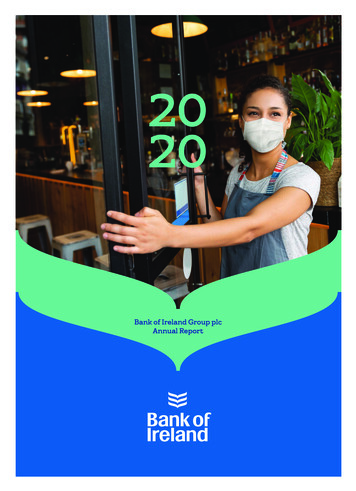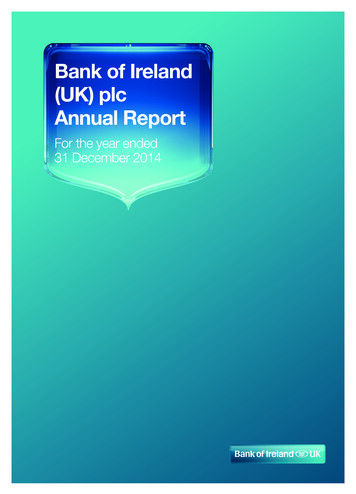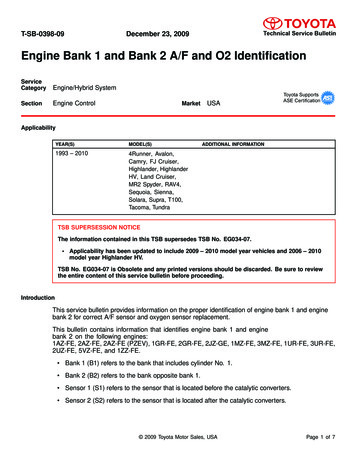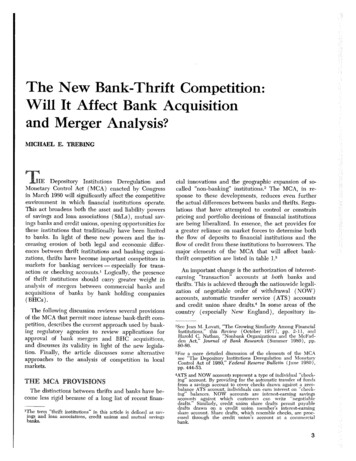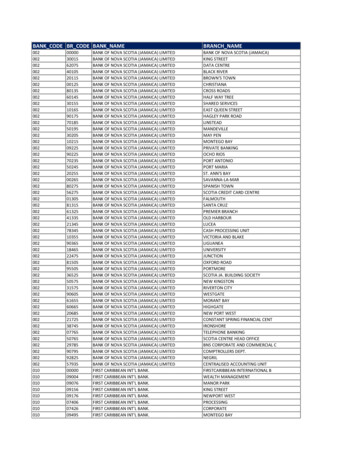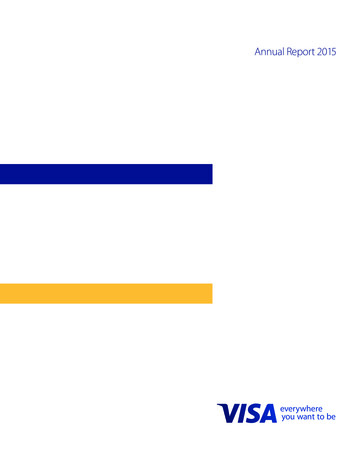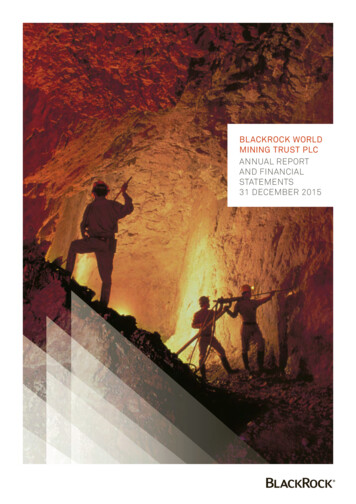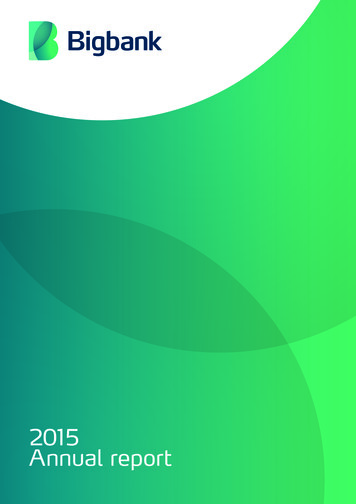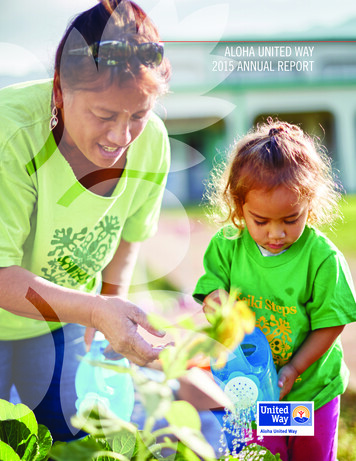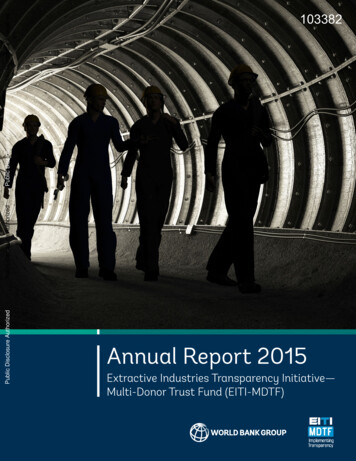
Transcription
Public Disclosure AuthorizedPublic Disclosure AuthorizedPublic Disclosure AuthorizedPublic Disclosure Authorized103382Annual Report 2015Extractive Industries Transparency Initiative—Multi-Donor Trust Fund (EITI-MDTF)
Annual Report 2015Extractive Industries Transparency Initiative—Multi-Donor Trust Fund (EITI-MDTF)
ContentsForewordIExecutive SummaryIIIResults Summary1Year in Numbers3Transition from EITI-MDTF to the Extractives GlobalProgrammatic Support (EGPS) MDTF5Supporting Civil Engagement Society7EITI Global Knowledge9Country UpdatesAfricaEast Asia and PacificEurope and Central AsiaLatin America and the CaribbeanMiddle East and North AfricaSouth AsiaAnnexesAnnex 1: EITI MDTF Annual FundingAnnex 2: EITI MDTF Grant Allocation and DisbursementAnnex 3: Global Knowledge, Learning Support, Fiduciaryand Support to Civil SocietyAnnex 4: Aggregated Data Resuts Framework EITI MDTF Inputs111117202224242525273638
ForewordPaulo de SaPractice ManagerEnergy & Extractives Global PracticeThe World Bank GroupTransition to a new era for EITI implementation support2015 marks the end of an era for donor supportto the EITI and the start of a transition to a new,improved approach to extractive sector supportthat will add great value to the World Bank s workon extractives. At the end of 2015, the ExtractiveIndustries Transparency Initiative Multi Donor TrustFund (EITI-MDTF) closed and was replaced by theExtractives Global Programmatic Support (EGPS)Multi Donor Trust Fund. The year’s work has focusedon completing EITI-MDTF grant activities, improvingresults reporting, facilitating a seamless transition toEGPS, and looking closely at the lessons from theEITI-MDTF that we can incorporate into our workmoving forward.As we look back at the ten years of EITI-MDTFimplementation, there have been many resoundingsuccesses as well as important lessons learned.In terms of success, the World Bank and partnersconducted outreach to over 50 countries toencourage them to join EITI, contributing to thecurrent tally of 49 EITI implementing countries, ofwhich 31 are compliant. In FY15, the World Banksupported 37 countries in their implementation efforts.This support has enabled these countries to improvedialogue on the value of their extractive industries,empower civil society organizations, open data onextractives revenues and payments to scrutiny, andfurther the agenda of broad extractive sector reform.During the year many implementing countries reachedan important milestone in publishing their first reportsunder the EITI Standard. Reports are now disclosingdisaggregated revenue figures, a wide array of sectorcontextual information and some have also startedto disclose contractual terms, information aboutbeneficial ownership and data in electronic formats.One of the key lessons we have learned fromimplementation of the EITI-MDTF is that our supportmust be more agile, strategic and measured. In thissense, we have incorporated many lessons learnedinto EGPS that will make it more programmatic innature and measure results more closely.Donors’ contributions to EITI-MDTF over the past tenyears have made these accomplishments possible.We look forward to enhancing the results of this workand linking it to the World Bank’s twin goals of endingextreme poverty and boosting shared prosperity. Ihope that this EITI-MDTF Annual Report highlights foryou some stories of our success and results over thepast year.Foreword Executive Summary Results Summary Year in Numbers EGPS Supporting Civil Engagement Society EITI Global KnowledgeI
IIEITI-MDTF Annual Report 2015
Executive SummaryIn FY15*, the EITI-MDTF provided more than US 9.3 million to37 countries. Of the US 9.3 million, US 4.7 million was disbursedthrough recipient-executed grants, World Bank-led technicalassistance, and CSO support. The other US 4.6 million wasdisbursed for global knowledge and learning activities.In FY15, EITI-MDTF funds supported 37 countries in bothEITI implementation and outreach. These countries are asubset of the 49 total EITI implementing countries (includingthe UK, Norway and USA), of which 31 are compliant and 18are candidates. New candidate countries in FY15 includedColombia, Myanmar, Seychelles and the United Kingdom. Newlycompliant countries included Chad, DRC, Guinea, Indonesiaand Trinidad & Tobago. Over its lifetime, EITI-MDTF support wasextended to all of the new candidate and compliant countriesthat were IDA/IBRD eligible.EITI MDTF Total Allocation by Region FY156% South AsiaMiddle East and %North Africa 14Europe and %Central Asia 7Latin America %and Caribbean 7East Asia and %27Pacific Islands39% AfricaIn FY15, a major focus of EITI-MDTF support was on helpingcountries prepare their first reports under the EITI Standard.For many countries, bringing together the additional contextualinformation (Requirement 3) for the first time and complying withthe more rigorous financial disclosures (Requirement 4) was amajor challenge.The EITI-MDTF continued its support to civil society organizations(CSOs) through its engagement with Publish What You Pay(PWYP) International and the Natural Resource GovernanceInstitute (NRGI). Both organizations worked to empower CSOsto engage more on EITI through training and fostering dialogueon important issues such as multi-stakeholder group (MSG)governance. EITI-MDTF direct CSO support which started in2010 concluded in FY15, with programs closing in Azerbaijan,Mozambique, Tanzania and Zambia. CSO Direct Support inEthiopia and Solomon Islands, and support to Papua New Guineathrough PWYP, will continue into 2016 via the EGPS MDTF.Global knowledge of EITI was further advanced by regionaltraining sessions held in Africa, Eastern Europe, Asia and LatinAmerica. The training focused on the implementation of theStandard, particularly work plan development, the inclusion ofnational priorities in EITI objective setting and reporting, andimproved use of EITI data and communications. These workshopswere complimented by the EITI Community of Practice (CoP),which is administered by the World Bank, and brings over 200MSG members and other stakeholders from various countries toan online community for continuous country-to-country dialogue.This year the EITI CoP also led several webinars in which EITIimplementers from different countries convened to discuss topicsof interest and consult on important questions such as validation.To better track the results and outcomes of EITI-MDTF support,the Result Framework from last year was improved with moredata being collected for each grant activity. FY15 was the secondconsecutive year in which results data was collected from EITIMDTF financed projects. The sample of data overlapping betweenFY14 and FY15 is relatively small but will grow each year asteams improve their data collection. FY15 data is more detailedthan the previous year and shows more consistency.*World Bank Fiscal Year 2015 runs from July 1, 2014 to June 30, 2015.Foreword Executive Summary Results Summary Year in Numbers EGPS Supporting Civil Engagement Society EITI Global KnowledgeIII
Country Results Highlights Albania: EITI legislation ensures reporting.In March 2015 the Albanian government amended the Hydrocarbon Law to require allhydrocarbon contract holders, as well as all national and local government institutions, toreport revenues and payments based on the EITI Standard. Burundi: EITI advances sector wide reform.An EITI Scoping Study informed the country’s broader extractive industries reformprogram, including goals of establishing a mineral database as well as simplifyingtaxation and improving monitoring of Artisanal and Small-scale mining operations. Ethiopia: CSOs empowered.The EITI MSG in Ethiopia created an informal CSO network that supported the flow ofinformation to the community and improved outreach. Mongolia: EITI data made available electronically.An electronic data reporting system was implemented with 987 companies now using thenew system which is available to the public. Mozambique: Going beyond the Standard.Mozambique’s latest report includes company-by-company payment and productiondata, as well as descriptions of in-kind royalties and first steps towards disclosing thebeneficial ownership of companies. Nigeria: EITI advances sector-wide reform.In May 2015, the new Nigerian administration expressed its commitment to use thegovernance and administrative reforms recommended in earlier NEITI audits as a guideto reform the oil, gas, and mining sectors. Philippines: Beyond Standard requirements.The first Philippines EITI report goes beyond Standard requirements and discloses 39contracts with extractives companies and 37 Memoranda of Understanding betweenextractives companies and Indigenous People. Senegal: EITI boosts credit rating.Moody’s Credit Rating agency noted Senegal’s EITI Candidacy as a reason forupgrading the country’s credit rating in early 2014. Sierra Leone: Beyond Standard requirements.In April 2014, the government published all re-negotiated contracts, with future contractsalso slated to be published. Ukraine: EITI advances sector-wide reform.Draft law on transparency and accountability prepared with significant input from civilsociety and other stakeholders.IVEITI-MDTF Annual Report 2015
Results SummaryThe EITI remains highly recognized by World Bank clients andwithin the organization. EITI reporting is an important commitmentunder IDA17 by the World Bank. IDA17 reporting includes severalindicators on Extractive Industries, of which EITI is prominent andcovers a majority of the countries supported by the EITI-MDTF. The number of CSOs represented on MSGs varied greatlyamong countries, but if some reporting difficulties are takeninto account, the number of CSOs represented on MSGsin FY15 was consistent with FY14. While all countrieshave roughly 1/3 of the seats on MSG allocated for CSOs,some countries like DRC, Nigeria, Mozambique, Mongolia,Philippines and Indonesia (among others) report estimatednumber of CSOs represented through coalitions on the MSG,while other countries (like Seychelles, Ukraine, Albania forexample) disclosed only the number of coalitions themselves,rather than the CSOs behind them. The number of females on MSGs unfortunately showeda decrease in FY15 compared to FY14 (from a medianof 25% to a median of 19%) – however, the sample wasnot the same (20 countries in FY14, 25 countries in FY15with several countries being different). One country thatindeed showed a significant reduction in this indicator wasAfghanistan (went from 30% to 6%). A positive trend in FY15 was that the time required toprocure an Independent Administrator remained eithercomparable or decreased. The average duration of 3.5months in FY15 (compared to 6.2 in FY14) to complete theprocurement process is a good result for a relatively complexcompetitive procurement. Discrepancies reported in EITI reconciliation reportsamong EITI-MDTF grant recipients remained modest inFY15 (in some cases slightly higher from previous year),which is consistent with the notion that the EITI is wellunderstood by the MSGs and the governments and datacollection is well mastered. Data on the time required to process grants did notchange significantly since most of the grants underimplementation in FY15 were initiated in earlier years. Notenough new grants were processed in FY15 to exhibit achange in this indicator.The following indicators highlight how the EITI-MDTF hasadvanced the initiative as countries continue to improve theeffectiveness of EITI implementation. 1The number of EITI implementing countries continues torise, as of mid-2015, reaching 48 (of which 36 are IDA), ofwhich 31 are EITI compliant (of which 22 IDA). Going forwardwe would expect the number of EITI implementing countriesto increase slowly.Revenues reconciled by recent EITI reports increasedin IDA countries but have declined among all EITIimplementing countries primarily due to lowercommodity prices. In the 25 IDA countries where reportswere available, revenues reconciled by EITI for 20121amounted to 180 billion (14 percent of GDP). This comparesto 95 billion in 2011 (16 percent of GDP). Among thelarger pool of all EITI implementing countries, reconciledrevenue amounted to close to 306 billion or 14 percent ofaggregated GDP, compared to 359 in 2011; 215 billion in2010, and 165 billion in 2009. Lower revenues reconciledwere recorded in 2012 due to (i) Indonesia not submittingdata; and (ii) a reduction of revenue due to market or otherconditions in large producers like Nigeria, as well as inKyrgyzstan, Kazakhstan, Mongolia, and on a smaller scale inseveral other EITI countries.At the country level, FY15 indicators show that almosthalf of Multi-Stakeholder Groups (MSGs) employedMonitoring & Evaluation systems as of June 2015 (10 outof 25).The majority of MSGs have adopted communicationsstrategies (18 out of 25, or over 70% of all EITI-MDTFsupported recipient executed projects in FY15) of whichvirtually all were providing information in formats adjusted forvarious users.Almost one third of the MSGs in the sample (7 out of 25)have incorporated gender into their communicationsstrategies and use specific tools to target women.Most recent year with most complete data.The indicators tracked in the Results Framework remains a workin progress and will be further improved next year for EGPS. It isdifficult to evaluate the data due to lack of baseline informationamong countries. We note the results for non-statistical purposesat this stage. The data we have collected over the past twofiscal years serves as a baseline for EGPS moving forward toensure that (i) EITI data is properly distributed, discussed andunderstood; and (ii) overall results of the program in MDTFrecipient countries are monitored and assessed.Foreword Executive Summary Results Summary Year in Numbers EGPS Supporting Civil Engagement Society EITI Global Knowledge1
2EITI-MDTF Annual Repo
EITI-MDTF Annual Report 2015 Country Results Highlights Albania: EITI legislation ensures reporting. In March 2015 the Albanian government amended the Hydrocarbon Law to require all hydrocarbon contract holders, as well as all national and local government institutions, to report revenues and payments based on the EITI Standard.
